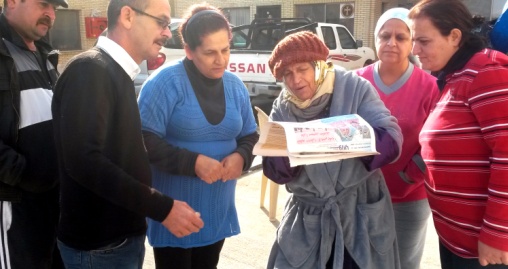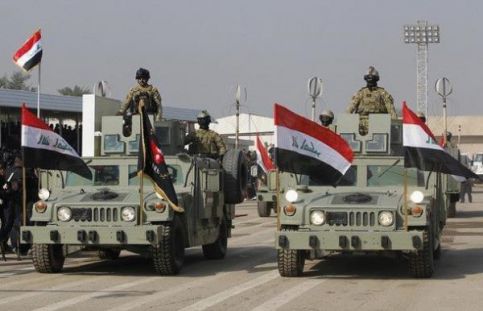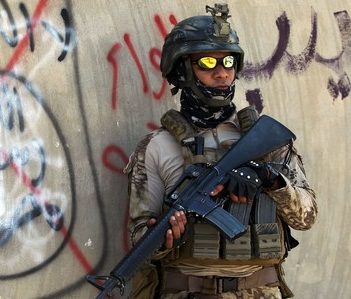Lies and Crazy Rumours: What Iraqis Believe About the USA
Iraq’s security crisis has caused local media to take sides more than ever. Amid the misinformation are conspiracy theories about how the US is secretly on the extremists’ side. Problem is, a lot of Iraqis believe the stories.

In the battles for hearts and minds playing out in the popular Iraqi media, it feels as though one side is winning. The way that the fighting against the extremist group known as the Islamic State is being covered is certainly not impartial. At best, unbalanced stories that praise Iraq’s Shiite Muslim fighters are being published in the hundreds of newspapers, satellite TV channels and radio stations owned by Shiite Muslim political parties in Iraq. At worst, rumours pushed by pro-Iranian and pro-Shiite-militia are being propagated.
Meanwhile even the more independent media outlets feel as though they cannot publish any news that might do harm to the efforts to push the Islamic State, or IS, group out of the country – including efforts by the unofficial Shiite Muslim militias, mostly made up of volunteers. The militias, who are fighting the IS group, which bases their ideology in Sunni Muslim beliefs, alongside the regular Iraqi army have been successful in their campaign – they recently retook the city of Tikrit from the IS fighters – but they have also been accused of committing crimes against the Sunni Muslim population.
In general there seems to be a movement in the local media that downplays the importance of the regular Iraqi army and police in the fight and that emphasises the role of Shiite Muslim militias. Last year in June when the security crisis first began, the Iraqi government, via its Communications and Media Commission, introduced new media regulations to regulate local press during the security conflict. As Human Rights Watch reported back then, “the guidelines unjustifiably restrict freedom of the press, including by requiring pro-governmental coverage”.
Under pressure, a lot of Iraqi media outlets abandoned any pretence at neutrality. Often they would report major victories by pro-government forces that saw hundreds of IS fighters killed. Local Shiite journalists embedded with the Iraqi military or travelling with Shiite militias were required to focus on the positive. Afterwards Iraqi audiences would discover that these reports were just lies.
Nonetheless all the half-truths and lies have created an ongoing state of confusion about who and what to believe.
Media controlled by Shiite Muslim interests are obviously not the only outlets to spread their side of the story. Some Iraqi Kurdish and Sunni Muslim-dominated media have also put undue emphasis on their own successes or pushed talking points that might further their own agendas.
And there are other more specific rumours. One that seems to be getting the most play and causing problems inside Iraq is about how the US-led international coalition has actually bombed Shiite Muslim militias from above and how they had been helping the IS group. These rumours started when leaders of militias – in particular, the more extremist militias like Iraq’s Hezbollah and the League of the Righteous, or Asa’ib Ahl al-Haq – said they saw US aircraft dropping weapons to the IS fighters by parachute. There were also some pictures posted on social media by IS fighters where they displayed several wooden boxes with US army logos on.
As UK newspaper, the Guardian, reported: “The Pentagon admitted on Wednesday that one of the airdrops of weapons intended for Kurds in the besieged Syrian town of Kobani almost certainly ended up in the hands of the Islamic State fighters. The Pentagon blamed the wind for possibly blowing the supplies off course and argued that one cache was not enough to make a significant difference”.
However without any further evidence, some Shiite Muslim politicians kept repeating the claims that the US was actively supporting the extremists.
The rumours then moved online – nobody knows exactly which websites were first to publish them – and went as far as Al Alam, an Iranian state-owned news site. It was also repeated on various Iraqi channels.
Similar rumours about other campaigns in places like Tikrit, Samarra and Salahaddin, have gone further. On February 23, the Iraqi Prime Minister Haider al-Abadi met with a group of Iraqi journalists and said that after a fact-finding mission, the government had confirmed that the rumours were exactly that: rumours. “And those who are spreading them are just trying to achieve certain aims,” al-Abadi said.
Members of the Iraqi army and police, as well as several other senior politicians, including Foreign Minister Ibrahim al-Jaafari and Defence Minister Khaled al-Obeidi, also denied that there was any truth to the rumours. In fact, the rumours became so prevalent that even the US government had to deny them in official statements.
None of that seems to have helped though – ask around and the majority of Iraqis still believe the rumours. The pro-Shiite and pro-Iran media appears to have been successful in convincing ordinary Iraqis that US planes are killing Iraqi soldiers, supporting the IS group and preventing the Shiite Muslim militias from liberating Iraqi cities. And you can see this just by checking comments on various social media platforms. Meanwhile anyone who questions the veracity of these stories is called a traitor and a supporter of the IS group.
There have also been other targets for the misinformation that has plagued the current security crisis. Another one concerns former Iraqi leader, Saddam Hussein’s eldest daughter, Raghdad. Despite the fact that Raghdad has been living in exile in Jordan for years now, rumour had it that she was in Tikrit this March supporting the IS group – she is well known to be supportive of the group, which initially allied itself with leaders of Hussein’s outlawed Baath political party. The same stories said that Raghdad had offered to bribe members of the Shiite Muslim militias with the wads of cash she is known to carry around, so that she be allowed to leave Tikrit unharmed.
Other rumours focus on someone Raghdad calls an “uncle” – Izzat Ibrahim al-Douri, whom the New York Times describes as “a top military commander and a vice president in the Hussein government and one of the few prominent Baathists to evade capture”. The stories say that al-Douri is in Tikrit – or earlier, he was supposed to be in Mosul – and planning to lead an army against the Shiite Muslim militias. Stories about al-Douri are backed by tales about the alleged arrest of his driver in the area, or the capture of his friends and relatives.
Given that Shiite Muslims in Iraq were oppressed by Saddam Hussein and his commanders for a long time, these rumours are perfectly timed to encourage the Shiite Muslim fighters into battle against someone who stands for all they hate.
Another aspect to the rumour mongering is the way that local media have built up certain characters in the war. One of these is a militia member called Abu Azrael. He’s amassed a huge following on Iraqi social media and his rise as a symbol of the Shiite Muslim fight back against the IS group, including his appearance on the Facebook page “reportedly belonging to Iran’s special forces”, has been documented by several media observers.
Additionally senior Iranian military commander, Qasim Soleimani, one of Iran’s formerly most secretive and most influential envoys, has also featured large in Iraqi media. He is often seen alongside Shiite Muslim militias and the pictures and praise are clearly meant to celebrate Iran’s role in this fight.
Often basking in the glory too, is Iraqi politician, Hadi al-Ameri, leader of the Shiite Muslim militia, the Badr Brigades – al-Ameri is a staunch advocate of Iran’s role in this crisis and has often been quoted saying that Iran saved Baghdad from falling to the IS group last year. Most recently he’s talked about how the militias don’t need US air support to take Tikrit. Only weaklings would ask for their support, he is reported to have said.
For some Iraqis, these campaigns to lionize certain individuals and win a psychological war of words and online media against the IS group and potentially also Sunni Muslim lobby groups, have worked. They repeat the stories of battle field heroism and you can find many using a picture of one or other of the above characters – particularly Soleimani – as a personal profile shot on their Facebook profiles.




